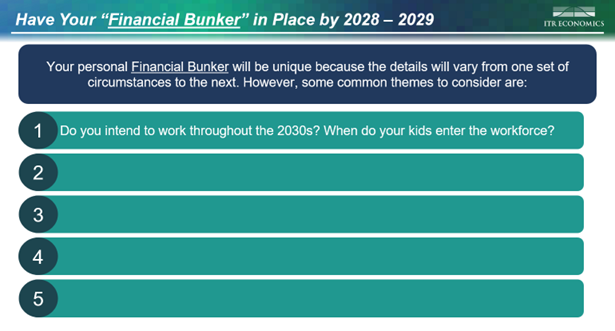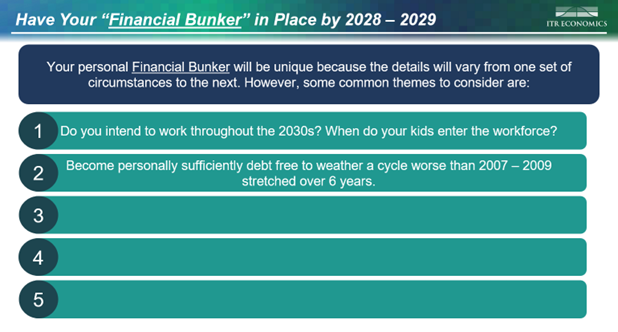3 Reasons Why You Want To Have a Financial Bunker
- Peace of mind going into a tumultuous time
- Positioning yourself to create wealth through the 2030s
- Cash is king at the bottom of a business cycle
Your personal Financial Bunker will be unique to you because your circumstances are unique to you. However, there are five broad common themes to consider.
1. Do You Intend To Own a Business or Otherwise Work Through the 2030s?
It will behoove you to know how resilient your industry will be given the severity and duration of the cyclical decline we are projecting. Some industries are going to be much more exposed to the downturn than others, and you may want to think about retiring sooner rather than later or if you really want to hand the reins over to the next generation of leadership. You could decide that your legacy will best endure as a family office managing finances and philanthropy for future generations and those less fortunate.

In terms of your children or grandchildren, will they be entering the workforce at a less-than-propitious time? Jobs will become very tough to find, as the millennials learned during 2007–2009. Encouraging the right education and career paths considering what is ahead could make all the difference in “life” from 2030–2036. The STEM disciplines and professional services will reign supreme as innovative technologies are built out in the US. Be careful about career paths in 2030–2036 that tend to align with your typical car salesperson, purveyor of mass-marketed hospitality, realtor, or retail worker.
[ Fill out our form to receive the full 5-step guide for building your Financial Bunker! ]
2. Become Debt Free
The economy will swing from inflation to deflation over the course of 2030–2036. Being in debt (renting money at a fixed rate) during inflation is normally a good economic move. However, a drop in income or lifestyle stemming from multiple sources could make servicing the debt difficult through the first half or so of the Depression. They include:
- Investment equity/values decline
- Vacancy rates for properties rise, negatively impacting passive income
- Job losses as businesses fold or activity is curtailed
- Fixed incomes suffer during periods of inflation
- More discretionary income is consumed by higher prices
It is wise to position yourself with sufficient liquidity to weather the economic storm before it hits; this far out it is not possible to project exactly when the economic downturn begins or specifically how hard the initial thrust downward will be. You will sleep better, and your wealth will not be exposed to as much risk, if you build a well-thought-out Financial Bunker.

Being in debt during a period of deflation is anathema to financial wellbeing. The value of the cash you hold during a period of deflation increases over time. During inflation, you pay back debt using cheaper and cheaper dollars. During a period of deflation, you are paying back debt with increasingly more valuable (expensive) dollars. Deflation is probable during the 2030s not only because of domestic economic but also global demographic and financial stresses.
Keep in mind:
- Being on a fixed income during a period of inflation is a favorable position to be in.
- Deflation means that it is virtuous to not purchase (fill in the blank for any hard good) because it will cost you less in the future.
- Cash at the bottom of the cycle will enable you to buy hard assets at discounted prices.
We will look at the other aspects of the Financial Bunker in future blogs. For now, ITR Economics can be of service via our webinars on the 2030s or our Financial Resilience program. Go to our website, itreconomics.com, to learn more or to contact an account executive.